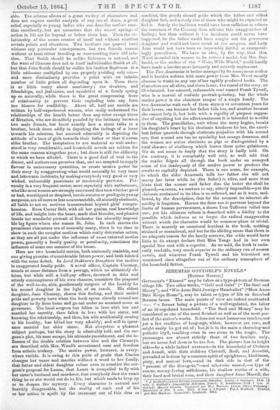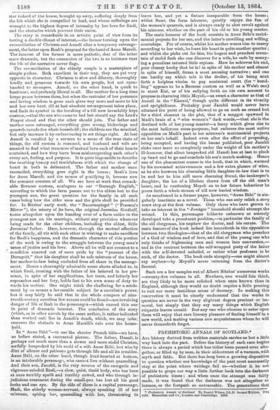JEREMIAS GOTTHELF'S NOVELS.*
[SECOND NOTICE.] GOTTIIELY'S " Kaserei" may be taken as a type-picture of Bernese village life. Two other works, " Geld and Geist" (" The Soul and Money"), and "Wie Anne Bahl Jowager Haushaltet" ("How Anne Bitbi Keeps House"), may be taken as types of life on detached Bernese farms. Tho main points of view are indeed contrasted "nes, t'm former being a picture of a well-regulated, the latter of an ill-regulated household. " The Soul and Money" may be considered as one of the most finished as well as of the most per- fect of the author's works. It does not want humorous touches, nor yet a few crudities of language, which, however, are rare, and might easily be got rid of; butat is in the main a chartniiirand pathetic idyll, reaching even in one scene to the tragic. The personages are almost strictly those of two families only, but we never feel them to be toe few. The picture has its bright side—for a while indeed overcast—in the household of Christen and Anneli, with their children Christeli, Ilesli, and Annelisi, pervaded at bottom by a common spirit of uprightness, kindliness, piety, and mutual love,—and its dark side in that of the " peasant of the Darogriit,"—not otherwise named,—a type of coarse, money-loving selfishness, his shallow victim of a wife, their hard and brutal sons, and their daughter Anne Mareili, the
•
J. Co'lhelf s (Albert Ditties) Gesammelte Saltness. Berlin : J. Springer. 1858. 12 vole. J. Gotthelf s datum/Wine Sehriften. Zurich: Schultlicsa. 1859. 7 vol.e. Got.helf, (Barra Choisies. Traduites par MIA Buchon. (Anne Bahl.) Fribourg Marchand et. Cie. 2 Tole. 1950. L'Amt et rArgent. Fur J. ClAthelf. Tradult par Max Dachau. Neuchatel Leut.huld. 1882.
star indeed of the house, brought up awry, suffering deeply from the life which she is compelled to lead, and whose sufferings are wrought to the highest degree of intensity by her love for Resli, and the obstacles which prevent their union.
The story is remarkable in an artistic point of view from its having a double climax of interest,—the former turning upon the reconciliation of Christen and Anneli after a temporary estrange- ment, the latter upon Resli's proposal for the hand of Anne Mareili. The interest of the former is more pathetic, that of the latter more dramatic, but the connection of the two is so intimate that the life of the narrative never flags.
The reconciliation of the elderly couple is a masterpiece of simple pathos. Both excellent in their way, they are yet very opposite in character. Christen is slow and dilatory, thoroughly kindly and generous towards his own people, but not open- handed to strangers. Anneli, on the other hand, is quick to hastiness, and profusely liberal to all. Her mother for a long time keeps peace between them, but when the restraint of her presence and loving wisdom is gone each gives way more and more to his and her own bent, till at lust absolute estrangement takes place, and finds its symbol in the breaking of a till now invariably kept Custom,—that the one who came to bed last should say the Lord's Prayer aloud and that the other should join. The father and mother once estranged, everything goes wrong, bickering and quarrels invade the whole household ; the children see the mischief, but only increase it by endeavouring to set things right. At last Anneli is recalled by a sermon to a sense of the true state of things, the old custom is resumed, and husband and wife are amazed to find what treasures of mutual love each of their hearts contained, and how they have been misinterpreting each other's every act, feeling, and purpose. It is quite impossible to describe the touching beauty and truthfulness with which the change of heart in both is delineated. The father and mother once reconciled, everything goes right in the house; Resli's love for Anne Mareili, and the means of gratifying it, become now the oommon concern of all. We see here at work that remark- able Bernese custom, analogous to our "Borough English," according to which the farm passes not to the eldest but to the youngest son, the great question for the family in all such cases being how the elder sons and the girls shall be provided for. In Bitzius' early work, the " Bauernspiegel " ("Peasant's Mirror "), the misery of its hero, the original Jeremias G-otthelf, turns altogether upon the handing over of a farm entire to the youngest son on his marriage, without any provision whatever being made for the other children, including the eldest, little Jeremias' father. Here, however, through the mutual affection of the family, all vie with each other in wishing to make sacrifices for Resli's happiness, and the dramatic character of this portion of the work is owing to the struggle between the young man's sense of justice and his love. Above all he will not consent to a condition exacted out of mere pride by the "peasant of the Dorngriit," that his daughter shall be sole mistress of the house, tier mother-in-law being excluded from all share in the manage- ment. Hence a thoroughly admirable scene above alluded to, in which Resli, treating with the father of his beloved in her pre- sence, ie spite of her supplications, her tears, and latterly her reproaches and her fury, holds fast to his own sense of duty to- wards his mother. One might think the chaffering for a settle- ment by uo means a favourable subject for a novelist's power, but it may fairly be said that in the whole compass of nine- teeuth-cen tury novelism few scenes could be found—not involving danger of life or limb to the personages—which exceed this one in point of dramatic interest. The conclusion of the story (which, as in other novels by the same author, is rather indicated than worked out) lies in Anneli's death, which, we may infer, removes the obstacle to Anne Mareili's rule over the house- hold.
In " Anne Biibi"—to use the shorter French title—we have, as before stated, a contrasted picture. The father, Hansli, is perhaps not much more than a slower and more stolid Christen, awfully henpecked by his scold of a wife Anne Biibi, but who by dint of silence and patience gets through life and all its troubles. Anne Blibi, on the other hand, though kind-hearted at bottom, is an intolerable personav, who cannot live without quarrelling. And their son, Jacobli, is the very reverse of the energetic and vigorous-minded Resli,—a slow, quiet, timid body, who has been at once terribly spoilt and terribly cowed, and who through in- judicious treatment during the small-pox has lost all his good looks and one eye. By the side of these is a capital personage, Madi, the elderly woman-servant, always speaking ill of her 'mistress, spiting her, quarrelling with her, threatening to leave her, and yet a fixture inseparable from the house; whilst Sami, the farm labourer, quietly enjoys the fun of the women's quarrels, and is always ready to abet revolt against his mistress, whether on the part of his old or his young master.
The main humour of the book consists in Anne BMA's matri- monial projects for her son, and the latter's unwilling and willing courtships. For of course, whilst his mother wants him to marry according to her wish, he loses his heart in quite another quarter ; and whilst she picks out for him, the hugest and proudest moun- tain of stolid flesh she can discover for a wife, he ends by marry- ing a penniless tattered little orphan. How he achieves his end, poor clumsy booby that he is! in spite of his mother and almost in spite of himself, forms a most amusing narrative ; and one can hardly say which tale is the droller, of his being sent forth a helpless victim to pay nocturnal court (for " bund- ling" appears to be a Bernese custom as well as a Welsh one) to stout Eisi, or of his sallying forth on his own account to propose to charming little Meyeli,—as sweet a character as that of Anneli in the " Kiiserei," though quite different in its vivacity and sprightliness. Probably poor Jacobli would never have attained the point of being allowed to go on such an errand but for a third element in the plot, that of a maggot spawned in Madi's brain of a " wise woman's" dark words,—that she is the destined wife of her young master—a fancy which gives rise to the most ludicrous cross-purposes, but enforces the most active opposition on Madi's part to her mistress's matrimonial projects on her son's behalf. Indeed even after the effort of proposing, being accepted, and having the banns published, poor Jacobli sinks once more so completely under the weight of his mother's ill-humour, that silent henpecked old Hansli has at last to pluck up heart and to go and conclude his son's match-making. Hence one of the pleasantest scenes in the book, that in which, warmed by his unwonted achievements and a few extra glasses of wine, as he sits between his charming little daughter-in-law that is to be and her to him still more charming friend, the innkeeper's daughter, the ice of a lifetime thaws from off the old man's heart, and in cautioning Aleyeli as to her future behaviour he pours forth a whole stream of till now buried wisdom. As mentioned in a former paper, however, "Anne Bahl" is sin- gularly inartistic as a novel. Those who can only relish a story must stop at the first volume. Only those who have grown to take an interest in the "Jowiiger " household should attempt the second. In this, personages hitherto unknown or scarcely developed take a prominent position,—in particular the family of the old clergyman, his nephew the doctor, and his curate. The main feature of the book indeed lies henceforth in the opposition between two theologies—that of the old clergyman who preaches of a God of wisdom and of love, and that of the young one who only thinks of frightening men and women into conversion,— and in the contrast between the self-wrapped piety of the latter with the self-devoted unbelief, or rather what professes to be such, of the doctor. The book ends abruptly—one might almost say anyhow—by Meyeli's never returning from the doctor's funeral.
Such are a few samples out of Albert Bitzius' numerous works —twenty-five volumes in all. Nowhere, one would fain think, are they likely to be more relished when once known than in England, although they would no doubt require a little pruning to suit our more fastidious sense of decency. In making this reservation it must be clearly understood that the works in question are never in the very slightest degree prurient or im- moral, but simply that they say many things which English etiquette leaves unsaid. But any one who chooses to enter upon them will enjoy that rare literary pleasure of finding himself in a new world, and making various new acquaintances whom he will never thenceforth forget.































 Previous page
Previous page